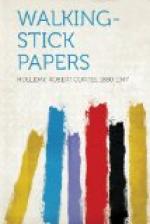Jimmy was a waiter, humble, but celebrated—as a waiter—among a circle. An admirer of Jimmy’s, a journalist continually on the lookout for copy, wrote him up for the paper at space rates. Thence till the day Broadway suffered his loss by untimely death did Jimmy fold and unfold his worn clipping to exhibit with a full heart this tribute to him which was of a kind (as he never failed to say) which “money could not buy.” It is reported upon reasonably reliable authority that Jimmy’s last words, in a faint whisper, were: “Money could not have bought------” And then he went on his way.
So it was, too, with a tobacconist whom I knew—who had an article framed which referred to his shop. “In such a paper, too!” he exclaimed a hundred times a day, “money could not have bought it.”
Your aunt has a lot of old spavined furniture which would bring about tu’pence at public sale. Some of it was your great-aunt’s. All of it has been in the family from time immemorial; and its peculiar and considerable value, your aunt and her neighbours are agreed, resides in the esoteric fact that it is the kind of thing which “money couldn’t buy.”
Health is a great blessing, and, we are repeatedly told, we should prize it beyond measure,—as it is a thing that money will not buy.
His money, it is commonly said of a rich man in bereavement, will not bring his son back to life. The impotency of money in the life of the spirit is notorious among us. Of a deceased miser we declare with satisfaction: “Well, he can’t take his money with him.” And money—the righteous well know—will get none into heaven.
What is the moving theme that holds the multitude at the movie theatre bound in a spell? What is it that answers deep unto deep between the literature vended at drug stores and the people?—Concern for money overthrown by idealism! The triumph of ethereal love over the base temptation of lucre! Is it not so: the rich wooer in the top hat and the elegant Easter-parade coat is turned away, and the poor lover with his flannel shirt open at the collar and a dinner-pail hung upon his arm is chosen for bluebird happiness—and the heart of the maligned masses is satisfied.
Money (the conviction has passed into an industrious bromideum) will not buy happiness.
I knew a man who had a wife; and he was told by sage counsellors that if he would treat her right she would give him “what money could not buy.”




